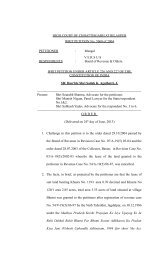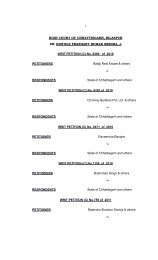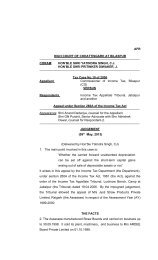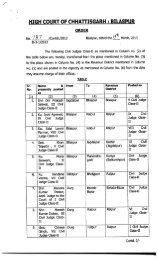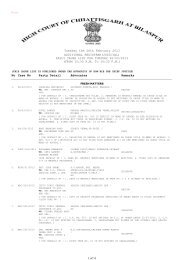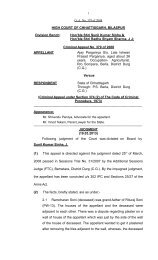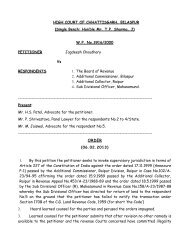HIGH COURT OF CHHATTISGARH : BILASPUR
HIGH COURT OF CHHATTISGARH : BILASPUR
HIGH COURT OF CHHATTISGARH : BILASPUR
You also want an ePaper? Increase the reach of your titles
YUMPU automatically turns print PDFs into web optimized ePapers that Google loves.
the authorities holding a departmental enquiry<br />
against a public servant. The Court is<br />
concerned to determine whether the enquiry is<br />
held by an authority competent in that behalf<br />
and according to the procedure prescribed in<br />
that behalf, and whether the rules of natural<br />
justice are not violated. Second, where there is<br />
some evidence which the authority entrusted<br />
with the duty to hold the enquiry has accepted<br />
and which evidence may reasonably support<br />
the conclusion that the delinquent officer is<br />
guilty of the charge, it is not the function of the<br />
High Court to review the evidence and to arrive<br />
at an independent finding on the evidence. The<br />
High Court may interfere where the<br />
departmental authorities have held the<br />
proceedings against the delinquent in a<br />
manner inconsistent with the rules of natural<br />
justice or in violation of the statutory rules<br />
prescribing the mode of enquiry or where the<br />
authorities have disabled themselves from<br />
reaching a fair decision by some<br />
considerations extraneous to the evidence and<br />
the merits of the case or by allowing<br />
themselves to be influenced by irrelevant<br />
considerations or where the conclusion on the<br />
very face of it is so wholly arbitrary and<br />
capricious that no reasonable person could<br />
ever have arrived at that conclusion. The<br />
departmental authorities are, if the enquiry is<br />
otherwise properly held, the sole judges of<br />
facts and if there is some legal evidence on<br />
which their findings can be based, the<br />
adequacy or reliability of thatevidence is not a<br />
matter which can be permitted to be canvassed<br />
before the High Court in a proceeding for a writ<br />
under Article 226.<br />
*** *** ****<br />
23. The jurisdiction to issue a writ of certiorari<br />
under Article 226 is a supervisory jurisdiction.<br />
The Court exercises it not as an appellate<br />
court. The findings of fact reached by an<br />
inferior court or tribunal as a result of the<br />
appreciation of evidence are not reopened or<br />
questioned in writ proceedings. An error of law<br />
which is apparent on the face of the record can<br />
be corrected by a writ, but not an error of fact,<br />
however grave it may appear to be. In regard<br />
to a finding of fact recorded by a tribunal, a writ<br />
can be issued if it is shown that in recording<br />
the said finding, the tribunal had erroneously<br />
refused to admit admissible and material<br />
evidence, or had erroneously admitted<br />
inadmissible evidence which has influenced<br />
the impugned finding. Again if a finding of fact



